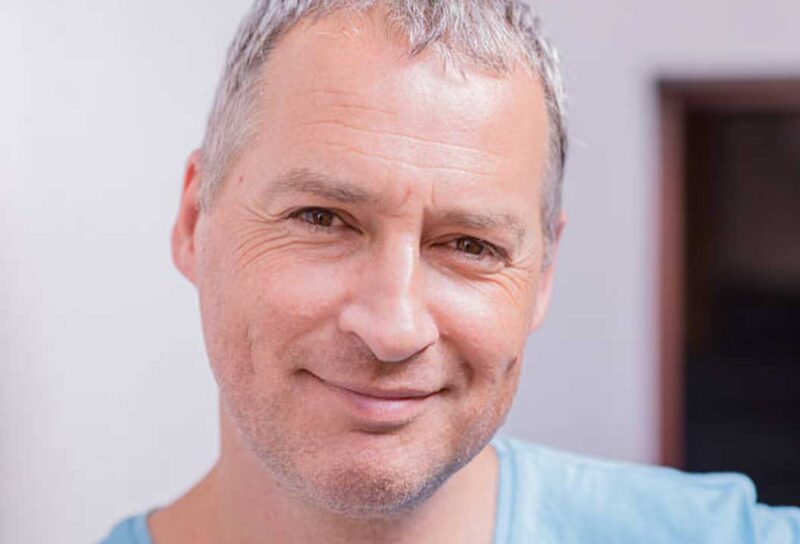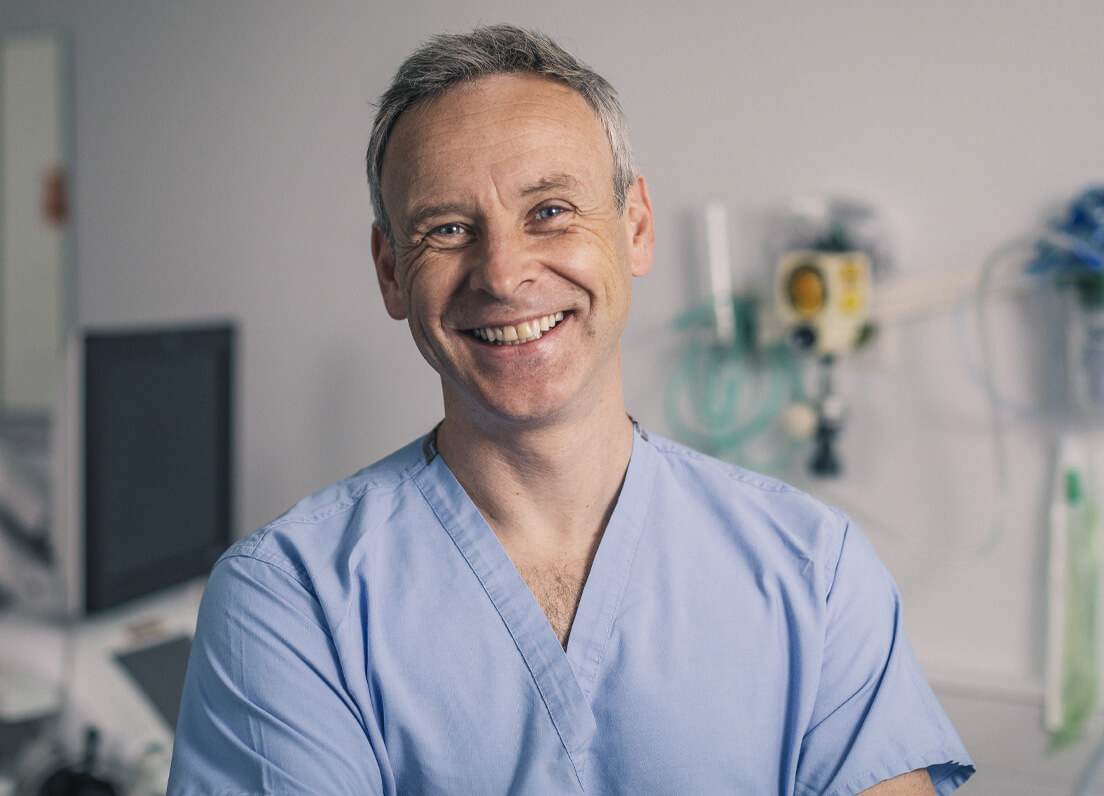Facelift Recovery Tips from Consultant Plastic Surgeon Anthony Macquillan
Recovery after a Facelift is a crucial phase that plays a significant role in the success and satisfaction of the surgical outcome. Typically, the initial recovery period lasts about two weeks, during which patients may experience swelling, bruising, and discomfort, which are manageable with prescribed medications. It’s essential for patients to follow the post-operative instructions meticulously.
In this blog, Consultant Plastic Surgeon Anthony MacQuillan offers tips and recommendations for a smooth and quick Facelift recovery. With over 20 years of experience, Anthony is a leading expert in facial rejuvenation and is regularly invited to national and international meetings to lecture on the subject.
What Is a Facelift?
Before exploring recovery tips, it’s crucial to grasp what a Facelift involves. In youth, the neck and lower jaw are usually well-defined structures. However, ageing can obscure this definition, leading to a less defined jawline and neck, as well as changes in the face itself including deepening of the nasolabial folds and the marionette lines (please see my blog on facial anatomy for Facelifts coming soon). A Facelift aims to re-establish this youthful definition.
Anthony’s approach to surgery is centred around listening to patients’ specific desires or concerns and providing transparent, realistic advice about achievable outcomes.
Recovery Tips after Facelift
Pre-Operative Preparation
Effective preparation for a Facelift extends beyond physical readiness; it involves mental and emotional preparation as well. Patients should thoroughly understand the procedure, risks, and expected outcomes. A good understanding of what your recovery will be like will reduce your post operative anxiety levels significantly (you can cope with pain if you are expecting it, but if you aren’t then everyone would worry something has gone wrong!).
Anthony stresses the importance of adhering to pre-operative instructions, which may include guidelines on medication, nutrition, and lifestyle adjustments. Nutrition is particularly important not only in the after period but also beforehand to ensure that you are in the best possible position before you start the healing process (a bit like athletes carbohydrate loading before a marathon).
This preparation phase is not only about ensuring a smooth surgery but also about setting realistic expectations, which is key to patient satisfaction.
Diligent Post-Operative Care
After the Facelift, it’s crucial to follow the surgeon’s post-operative care instructions meticulously (if you are having surgery with me then we will run through these before hand as well as afterwards before you go home).
This usually includes proper management of prescribed medications to alleviate pain and reduce the risk of infection, attending all follow-up appointments for professional assessment of the healing process, and taking care of incision sites as advised to minimise scarring and complications. This diligent care is essential for a smooth recovery and optimal results.
Prioritising Rest
Rest is vital for recovery. The body needs time to heal, and overexertion can lead to setbacks. Patients should avoid any form of strenuous activity, exercise, and should not bend over (as this will increase the chances of having a bleed under the skin) or pick anything heavy up (for the same reason) during the initial recovery phase. Having sex is included under the headings of strenuous activity/exercise (take your pick on which category to choose!) – I have seen several people have a reasonable size bleed over a week down the line from surgery due to this (again it is because blood pressure gets raised).
Ensuring adequate sleep and allowing the body to rest can significantly enhance the healing process (you will need to sleep in an inclined position for the 2 weeks following surgery).
Healthy Lifestyle Choices
Nutrition plays a critical role in healing. A diet rich in vitamins, minerals, and proteins (try to get at least 80g of protein a day for the 4 weeks before surgery and the 4 weeks afterwards) can significantly aid in the recovery process. Foods high in vitamin C and zinc, for instance, can promote wound healing and boost the immune system. Proper hydration is also essential for maintaining skin health and aiding in overall recovery.
Sun Protection
Post-surgery, the skin, particularly in the areas treated, is more vulnerable to sun damage. Excessive sun exposure can lead to complications such as pigmentation issues and prolonged swelling. It’s important to use a high-SPF sunscreen, wear protective clothing, and avoid direct sun exposure, especially in the early stages of recovery.
Realistic Expectations
Understanding that recovery is a process that takes time is crucial. Swelling, bruising, and changes in skin sensation are going to occur and can be concerning if not expected. It is important to remember that these are normal parts of the healing process. The final results of a Facelift will take months to fully materialise and patience is essential. A lot of what you see published (‘this is my patient 3 days after having had Facelift surgery’ – with no visible signs of having had an operation!) either relates to a different operation or has itself undergone a ‘procedure’!
Emotional Well-being
The emotional impact of a Facelift is significant. Changes in appearance can affect one’s self-image and emotional state. Having a strong support system in place, whether it’s friends, family, or a professional support group, can provide the necessary emotional support and reassurance during this transformative period. Expect to feel low immediately following the surgery – it is going to be uncomfortable and you will be swollen and wondering why you did this to yourself! It will take a week or so before you even begin to see the benefits. However if you are prepared for this then you will be able to rationalise how you are feeling and this particular part of the recovery process will pass quickly (you can always call and come in to see me if you need a bit of reassurance and support – that’s what we are here for).
Regular Follow-Up Care
Regular follow-up appointments are essential for monitoring the healing process and ensuring that the recovery is on track. These appointments allow Anthony to assess the progress of healing, address any complications early, and provide you with peace of mind.
Patience during Recovery
Recovery from a Facelift is not instantaneous. It’s important for patients to understand that healing is a gradual process. Patience is key, and rushing the recovery can lead to complications or suboptimal results. Giving the body the time it needs to heal is essential for achieving the best possible outcome.
Open Communication with Anthony
Open and honest communication with your plastic surgeon (me if you are my patient) is vital throughout the recovery process. Anthony encourages patients to ask questions, express concerns, and discuss any discomfort they may be experiencing. This open dialogue ensures that any issues are promptly addressed and it always help to know that support and reassurance is there if you need it.
In-Depth Recovery Insights
- Managing Pain and Discomfort: Post-operative pain and discomfort are to be expected but can be managed. We always prescribe enough pain medication to go home with that will get you through the discomfort of the first few days – it’s important to use them as directed and on a regular basis (it is much easier to stay on top of the pain rather than to try to get it under control). Keeping the head elevated, even while sleeping, can help reduce swelling and will help reduce your levels of discomfort.
- Incision Care: Proper care of incision sites is critical for preventing infection and ensuring smooth, less noticeable scars. Anthony provides specific instructions on how to care for these areas, which may include gentle cleaning and applying prescribed ointments.
- Nutrition and Hydration: A well-balanced diet aids in faster healing. Foods high in protein, vitamins A and C, and minerals like zinc can boost the body’s repair process. Staying hydrated is equally important, as it helps maintain skin elasticity and overall health.
- Activity and Exercise: While rest is important, gentle activities like short walks can promote blood circulation, reducing the risk of blood clots. However, it’s crucial to avoid strenuous activities and heavy lifting for a at least 2 weeks following the surgery.
- Dealing with Emotional Ups and Downs: It’s normal to experience a range of emotions after a Facelift. It is normal for you to feel impatient or anxious about seeing the final results or worry about the recovery process and understanding the time frames involved beforehand can help with this. Likewise please understand that we (myself and the team) are available to talk to and provide support should you need someone to speak to.
- Long-Term Care and Maintenance: After recovery, maintaining a healthy lifestyle and skincare routine is key to preserving the results of the Facelift. This includes regular use of sunscreen, a good skincare regimen, and avoiding factors that accelerate ageing, like smoking and excessive alcohol consumption. Maximising your surgical result (by adding in post op skin treatments and volume maintenance) is a whole other blog post which will be arriving soon!

FAQs about Facelift Recovery
How long does it take to fully recover from a Facelift?
- The timeline for full recovery from a Facelift can vary depending on the individual’s health, age, and the extent of the procedure. Most patients can expect to return to normal activities within 2 to 4 weeks. However, it will take many months for all the swelling to subside and for the final results to be fully visible. Anthony provides a personalised recovery timeline during consultations.
Can I wear makeup after my Facelift surgery?
- I would always advise you to wait until the incision lines have sufficiently healed before applying makeup, which is typically around 2 weeks after the surgery. It’s important to use gentle, non-irritating products and to apply them carefully to avoid disturbing the healing tissues. Anthony can provide specific recommendations based on your skin’s condition post-surgery (please note this refers to how your skin is healing not in relation what make up he would suggest you wear).
When can I resume exercise after a Facelift?
- Light walking can be resumed fairly soon after surgery to promote circulation, but more strenuous activities should be avoided for at least 4 to 6 weeks. High-impact exercises, heavy lifting, and strenuous workouts can increase blood pressure and lead to swelling, affecting the healing process. Anthony will advise you at your follow up consultations when it’s safe to gradually reintroduce different types of exercise.
Are there any specific sleeping positions recommended post-Facelift?
- Yes, it’s recommended to sleep with your head elevated and on your back for several weeks post-surgery. This position helps to reduce swelling and prevents putting pressure on the healing facial tissues. Using extra pillows or a recliner chair can be helpful in maintaining this position while sleeping.
How do I know if my recovery is progressing normally?
- Normal signs of recovery include gradual reduction in swelling and bruising, and the incisions beginning to heal without significant redness or discharge. It’s important to attend all follow-up appointments – it allows Anthony and his team to monitor your recovery and address any concerns. If you experience unusual symptoms, such as severe pain, excessive swelling, or signs of infection, you should contact us immediately.
Further Reading about Face Procedures with Anthony MacQuillan
- Facelift Surgery
- Ear Correction Surgery
- Eyelid Surgery
- Visible Effects of Ageing That Can Be Improved With a Facelift
- Top Tips to Sleep Better After Facelift Surgery



